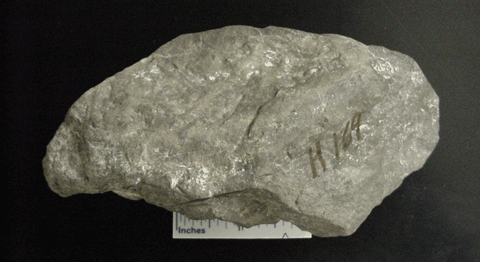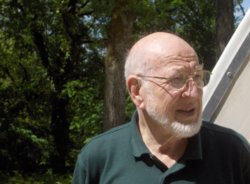Can the production of nuclear materials for nuclear weapons be banned?
10 Sep, 2009 12:24 pm
An international treaty to ban the production of fissile materials for nuclear weapons, referred to by US President Barack Obama on 5 April 2009 in Prague(1), is generally called a Fissile Materials Cutoff Treaty (FMCT). The negotiation of a FMCT has just begun in the 65-member Conference on Disarmament (CD) in Geneva, the international forum for arms control and disarmament.
 |
The importance of ending the production of fissile materials for nuclear weapons was first recognized soon after the end of the Second World War, by, for example, the 1946 Baruch and 1946 Acheson-Lilienthal Plans, proposals to eliminate nuclear weapons, and other weapons of mass destruction, from national arsenals and to bring nuclear technology under international control. The failure to achieve a ban on nuclear weapons triggered the Soviet-American nuclear arms race.
The Baruch Plan was followed by various oth er proposals but it was not until the early 1990s that a Fissile Material Cut-Off Treaty (FMCT) was put on the international agenda [see (3) and (4)].
In September 1993, the Clinton Administration proposed an international agreement to "ban the production of these materials forever". Three months later, in December 1993, the UN General Assembly passed, without opposition, Resolution 48/75L which called for negotiations on: "A non-discriminatory, multinational and internationally and effectively verifiable treaty banning the production of fissile material for nuclear weapons and other nuclear explosive devices"(5).
To start the process of implementing the Resolution, Ambassador Shannon of Canada was asked to carry out consultations at the CD. In March 1995, the CD agreed, by consensus, that it was the appropriate forum to discuss the FMCT and that it should establish an ad hoc committee with a mandate based on Resolution 48/75L.
The subsequent 1995 NPT Review and Extension Conference firmly placed a FMCT into its Programme of Action for Nuclear Disarmament. However, it was not until August 1998 that the CD in Geneva agreed to adopt the Shannon Report as a basis for negotiations and the ad hoc committee was finally set up. But the committee did not meet because the major differences over the scope and verification of a FMCT, which had dogged the earlier consultations, continued to prevent any progress.
The 2000 NPT Review called for the CD to commence negotiations on a FMCT immediately. But it proved impossible to even start negotiations, with key nuclear-weapon powers again putting forward different priorities and linkages. Until August 2003, for example, China refused to discuss a FMCT unless negotiations also began on the prevention of an arms race in outer space (PAROS). When China relented, the Bush Administration delayed progress by demanding unachievable demands for the verification of a FMCT.
So far, there have been fundamental differences between the members of the CD over the scope of a treaty, the inventories to be included, the definition of what constitutes fissile material, and the kinds of verification and safeguards measures that would be acceptable. The USA and the other established nuclear-weapon countries (China, France, Russia, and the UK) emphasize the non-proliferation objectives for an FMCT and, therefore, that a ban should only be applied to future production. The established nuclear-weapon countries claim to have ceased military production, while India, Pakistan and, probably, Israel are thought to have active programmes for the production of fissile materials for weapons.
There are other major differences. The established nuclear-weapon countries consider that without India, Pakistan and Israel, the cost of extended verification and safeguard measures would be too high. The approach of these latter three states is largely influenced by their own perceptions of regional security in South Asia and the Middle East respectively. Meanwhile, other members of the CD, including the Non-Aligned Movement (NAM), see the FMCT as a disarmament measure that should be non-discriminatory, as called for in Resolution 48/75L. This means that it should cover existing stocks of fissile material as well as future production.
Further difficulties have arisen over the definition of 'fissile materials'. Should this just cover so-called 'direct use' (weapon-grade) material or also other fissile material (weapon-usable material)? Likewise, what activities constitute 'production of fissile materials'? Is it just plutonium reprocessing and uranium enrichment or should other nuclear activities or even civil reactors and spent reactor fuel stores be included? What is the status of 'weapon-usable' fissile material, particularly, civil plutonium separated from spent civil nuclear-power reactors which could be used to fabricate nuclear weapons? (6).
The negotiation of a FMCT would have advantages for all countries. For the established nuclear-weapon powers it would indicate their commitment to nuclear arms control and disarmament. Since India, Israel and Pakistan are members of the CD, their participation in FMCT discussions would bring these countries, currently outside the NPT regime, into it.
A FMCT is urgently needed to: put new life into negotiations on further nuclear arms control and disarmament measures; control the spread of nuclear weapons to countries that do not know have them; encourage the control of fissile materials from which nuclear weapons or nuclear explosives can be fabricated; increase the proportion of weapon-usable fissile materials under international nuclear safeguards; improve the effectiveness of nuclear-export policies; reduce the discrimination inherent in the present NPT regime by narrowing the gap between the mutual obligations of countries with nuclear weapons and those that do not have them; and, importantly in today's world, reduce the risk of nuclear terrorism through the illegal diversion of fissile materials.
A verified ban would, furthermore, be fundamental to any comprehensive nuclear disarmament and non-proliferation regime. The measures and requirements for verification and control would be little different to those necessary to enable complete nuclear disarmament. Indeed, any progress on nuclear disarmament would make little sense in the absence of a ban on the further production of fissile material.
There is no particular difficulty in composing a FMCT. A number of governments (for example, Japan) and non-governmental organizations have produced draft treaties. The most recent one is published by the International Panel on Fissile Materials (IPFM), an influential, authoritative and independent g roup of arms-control and nonproliferation experts from both nuclear weapon and non-nuclear weapon states (7) . The IPFM is co-chaired by Professor R. Rajaraman, Jawaharlal Nehru University, New Delhi, India and Professor Frank von Hippel of Princeton University, USA. Its members include nuclear experts from sixteen countries: Brazil, China, France, Germany, India, Japan, the Netherlands, Mexico, Norway, Pakistan, South Korea, Russia, South Africa, Sweden, the UK, and the USA. The IPFM draft could be rapidly converted by the CD into a formal FMCT.
A major reason for optimism about achieving a FMCT in the foreseeable future is the fresh approach of the Obama Administration. Under active American leadership, the CD may, after 12 years of stalemate, make real progress in nuclear arms control and disarmament, starting with a FMCT. At last!
References
1. On 5 April 2009, US President Barack Obama said, in a speech made in Prague, Czech Republic: "o cut off the building blocks needed for a bomb, the United States will seek a new treaty that verifiably ends the production of fissile materials intended for use in state nuclear weapons. If we are serious about stopping the spread of these weapons, then we should put an end to the dedicated production of weapons-grade materials that create them. That's the first step. Second, together we will strengthen the Nuclear Non-Proliferation Treaty as a basis for cooperation"White House Press Office, Remarks by President Barack Obama, Prague, 5 April 2009 . www.whitehouse.gov/the_press_office/Remarks-By- President - Barack - Obama -In- Prague -As-Delivered/
2. Gottemoeller's Remarks at the Conference on Disarmament , Text of speech given at: www.america.gov/st/texttrans-english/2009/June/20090604140121xjsnommis0.8338587.html
3. Frank Barnaby and Nick Ritchie, Why a Fissile Material Cut-off Treaty is needed: FMCT Handbook, a guide to a Fissile Material Cut-off Treaty , Oxford Research Group. www. oxfordresearchgroup .org.uk/publications/books/pdf/ fmct ch1.pdf
4. Basic/Oxford Research Group, The Importance of a Fissile Material Treaty, Basic/Org Project Briefing Number 7, March 2005.www.basicint.org/nuclear/NPT/2005rc/brief07.htm
5. UN General Assembly 48/75L Consensus Resolution, 16 December 1993, Prohibition of the production of fissile materials for nuclear weapons or other nuclear explosive devices , www.acronym.org.uk/fissban/unga93.htm
6. J. Carson Mark, Explosive Properties of Reactor-Grade Plutonium , Science and Global Security, Vol.4, pp.111-128, 1993,
and Richard L. Garwin, Reactor-Grade Plutonium Can be Used to Make Powerful and Reliable Nuclear Weapons:Separated plutonium in the fuel cycle must be protected as if it were nuclear weapons, Federation of American Scientists, August 26, 1998.
www.fas.org/rlg/980826-pu.htm
7. International Panel on Fissile Materials, IPFM Releases Draft International Treaty to Ban Production of Fissile Materials for Use in Nuclear Weapons: Fissile Material Cut-Off Treaty.
www. fissilematerials .org/
-
12/12/12
Peak Oil is Nonsense Because Theres Enough Gas to Last 250 Years.
-
05/09/12
Threat of Population Surge to "10 Billion" Espoused in London Theatre.
-
05/09/12
Current Commentary: Energy from Nuclear Fusion Realities, Prospects and Fantasies?
-
04/05/12
The Oil Industry's Deceitful Promise of American Energy Independence
-
10:00
Shaky Foundations for Offshore Wind Farms







 Read more
Read more
Not only new weapons should be developed but all old weapons May be destroyed by each country who so ever have nuclear weapons.
The Nuclear weapons are the reason of cold war which still exist,
And there may not be peace on our planet till all countries destroy the entire existing nuclear weapon and make a universal agreement that in
Future they never ever will produce any nuclear weapons.
It is only possible if all big and small country does not have
Dirty desire to expand their territory and bull with any other country?
Dilawar Arora
13th September 2009